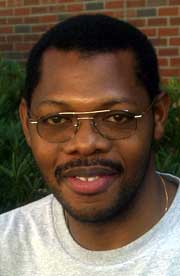 Emailed to us by gurentu@hotmail.com:
Emailed to us by gurentu@hotmail.com:
It is a language dating back to the 1600s, rarely heard of and not even listed in the dictionary, but anthropology doctoral student Santiago Ruiz has always been interested in preserving the language he grew up speaking: Garifuna. From developing a Garifuna language course at UF to speaking with the US Congressional Black Caucus and the World Bank's Environmentally and Socially Sustainable Development Unit, Ruiz is making strides in preserving the language and sharing it with those who may not have otherwise heard of it.
A mix of Afro-Caribbean and American Indian languages, especially Carib and Arawak, the Garifuna language is spoken mainly in Honduras, Belize, Guatemala and Nicaragua, as well as in New York, New Orleans, Chicago, and California--with the US having the second-largest concentration of the language. "While the language has a unified grammar structure, there is a different vocabulary for men and women, based on the influences of the two languages," says Ruiz. "We estimate there are 300,000 people living in Garifuna communities worldwide, but only half speak the language. Despite the concentrations, there is no formal teaching of the language anywhere in the world."
After completing his master's degree at UF on the strength of Garifuna in Belize, Honduras and other Central American countries, Ruiz spoke with anthropology chair Allan Burns and Center for Latin American Studies director Charles Wood about beginning such a course. The course was widely accepted, and Ruiz took time off to conduct research in Belize and Honduras and compile course materials. This fall is the second semester the course is being offered.
Burns says Ruiz's efforts are making an impact on students and the education community. Course materials created by Ruiz are being used in Belize and Honduras, and a DVD version of the course is being placed on the Web as a distance-learning course.
"The Garifuna class certainly enhances the mission of the college and university to strengthen teaching and learning about the different languages, literatures and cultures of the world," Burns says. "The best universities in the country are known for their great language programs, and this course helps put UF up with the best."
Students in the class do more than learn, they help develop the course. "Each semester, students must give something for the next class," Ruiz says. Students use their own talents and interests to further develop the text and course materials. One student created a DVD in Belize about the reactions to the course syllabus. Several students have applied for Fulbright scholarships on topics such as ethno-medicine in Garifuna communities, and one will complete a master's degree in comparative studies of amphibians in Garifuna communities. Others have dedicated their thesis research to related fields, such as migrants in Belize. This semester, students will record three- to four-minute conversations for the spring class to use in comprehension exercises.
While UF is playing a large role, Ruiz says it is necessary to build partnerships across the globe to ensure success in the program. Already, he is working with the Inter-American Foundation in Washington, DC to develop a bilingual education bachelor's degree program in Honduras and coordinating with Howard University for research visits to Honduras next summer.
"We're trying to make history," Ruiz says. "This language is in danger of disappearing, so unless we do something to prevent it, there may no longer be a Garifuna language. We're pioneering a program, and it's spreading."
--Kimberly A. Lopez
|